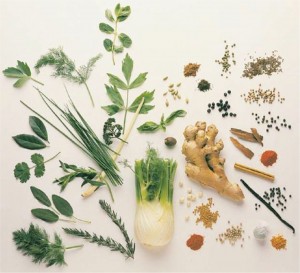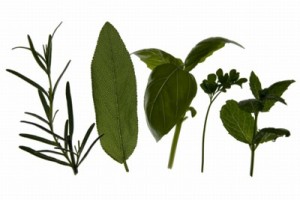 Culinary herbs are regarded as an irreplaceable cooking aid, giving dishes depth and complexity. Many of these herbs we have come to love offer medicinal benefits as well as being delectable. Rosemary, a favorite for flavoring meat dishes such as roasts and stews, is believed to have profound effect on the mind, improving concentration and increasing memory. The herb has significant antioxidant properties which make it ideal for preserving meats, one of it’s earlier uses. Rosemary also aids in digestion and is a diaphoretic – it promotes sweating and has been used to break fevers. Parsley, another local favorite, is referred to as “natures breath-freshener”, it can be chewed fresh or added to flavorful dishes to fight bad breath. The Romans and Greeks used this herb to prevent gas and nausea, and a tea was made to treat complications of the liver. Some herbalist believe that fresh parsley is a histamine blocker in action, relieving minor itching and other symptoms related to allergies. Thyme is an essential flavoring for soups and stews, and has been used for centuries as an antispasmadic. Teas are made to calm whooping cough, break up phlegm, and reduce post nasal drip. Teas are also drunk cold to relieve headaches. Oregano can actually refer to nearly 40 different herbs – most all work as a digestive aid to treat upset stomach, vomiting and diarrhea. The herb is usually served with large, heavy meals. An oregano tea can be used when fighting colds – it too will break up phlegm and relieves bronchitis.
Culinary herbs are regarded as an irreplaceable cooking aid, giving dishes depth and complexity. Many of these herbs we have come to love offer medicinal benefits as well as being delectable. Rosemary, a favorite for flavoring meat dishes such as roasts and stews, is believed to have profound effect on the mind, improving concentration and increasing memory. The herb has significant antioxidant properties which make it ideal for preserving meats, one of it’s earlier uses. Rosemary also aids in digestion and is a diaphoretic – it promotes sweating and has been used to break fevers. Parsley, another local favorite, is referred to as “natures breath-freshener”, it can be chewed fresh or added to flavorful dishes to fight bad breath. The Romans and Greeks used this herb to prevent gas and nausea, and a tea was made to treat complications of the liver. Some herbalist believe that fresh parsley is a histamine blocker in action, relieving minor itching and other symptoms related to allergies. Thyme is an essential flavoring for soups and stews, and has been used for centuries as an antispasmadic. Teas are made to calm whooping cough, break up phlegm, and reduce post nasal drip. Teas are also drunk cold to relieve headaches. Oregano can actually refer to nearly 40 different herbs – most all work as a digestive aid to treat upset stomach, vomiting and diarrhea. The herb is usually served with large, heavy meals. An oregano tea can be used when fighting colds – it too will break up phlegm and relieves bronchitis.




